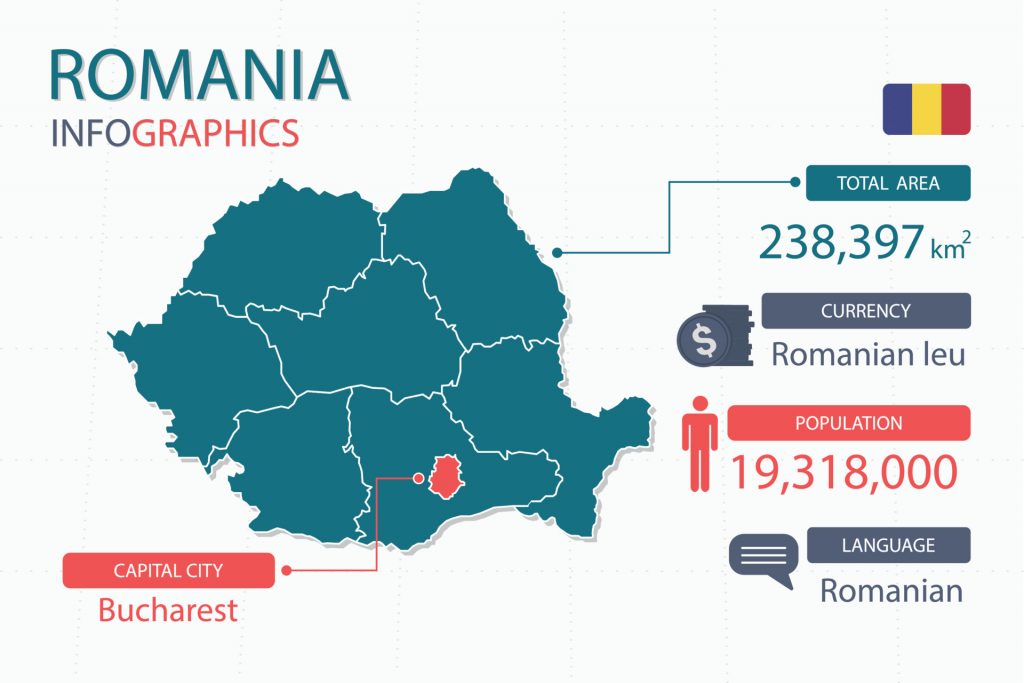The origins of the Romanian Language
Romanian is spoken as a native language by about 25 million people. It is spoken primarily in Moldova and Romania. In both of these countries, it holds official status. In addition, it is also the official status of the European Union. During the Soviet era, it was called Moldovan and some still refer to it by the appellation, but officially and by most, it is called Romanian.
Romanian has much in common with other Romance languages, including French, Spanish, Portuguese, and Italian. For example, it has a gender system (in Romanian’s case, male, female, and neuter), and adjectives change in form to agree with the nouns and pronouns that it refers to. Unlike the other Romance languages though, definite articles are placed after the noun. The word order is similar to the other Romance languages, with an order of subject-verb-object. Most recently, English words have been borrowed and assimilated into the language.
VEQTA can provide a skillful translator to Romanian with a background suitable for a Romanian translation of your content and subject matter. All our linguists can also translate Romanian to English.
After its split from Vulgar Latin, a lot of vocabulary influence came from French. However, perhaps due to its geographic location, there is also evidence of influence from the languages spoken in Balkan countries, including Greek, various Slavic languages, and Turkish languages. In the middle ages, there have also been words borrowed from Classical Latin which made its way into the spoken speech.
Romanian’s history with writing is diverse. At one point, it was written with Cyrillic. However, during the late 18th century, the use of Cyrillic declined in favor of the Latin alphabet. Interestingly, in the Soviet Republic of Moldova, a modified version of Cyrillic was in use up until 1989, and in Transnistria, the Cyrillic alphabet continues to be used.

The Romanian alphabet contains all the aspects of the Latin alphabet, except that K, Q, W, and Y are not an official part of it. In addition, there are five other letters that have been made to accommodate Romanian phonemes. These are Ă, Â, Î, Ș, and Ț. There are some spelling differences between spelling rules in Romania and Moldova, especially after new spellings rules were introduced in 1993 by the Romanian Academy governing spelling in Romania. Moldova did not officially switch to the new rules in 2011, and many people these days still employ the old spelling.
Like other languages, Romanian descendant from the Vulgar Latin spoken in the present-day regions of Romania and Moldova. Vulgar Latin was the vernacular dialects spoken by the everyday people during the Roman Empire and after. Some scholars also believe that it also infused with the military Latin that was spoken in the region, as very unique vocabulary relating to military have been preserved in Romanian.
In its early history, Romanian was used among the people who lived in the areas of Moldavia, Transylvania, and Wallachia, whose people called themselves romanesci. This was before any true establishment of a state or country of Romania. Not much records have been kept from this time though besides a few texts and documents. However, during the 15th century to the 18th century, Romanian seemed to have become more of a public language as it was used both in literature and by the Church.
The First Romanian grammar was published in 1780. In addition, Moldavian, an appellation for Romanian at the time was also an official language in Bessarabia, a region where Moldova currently exists. In this area and period, Russian was a language of status while Moldavian was the colloquial language spoken by common folk.
In 1881, the Kingdom of Romania was established, and in the early 1900s, a Romanian identity had risen to the surface, along with Romanian linguistic aspirations. At this time, Romanian was introduced into schools as the language of education, and Romanian-language media, such as newspapers, emerged. In 1918, more regions joined to form Romania, including Transylvania, Bessarabia, and Bukovina, and in 1923, Romanian became enshrined as the official language in the Constitution of Romania.
In Romania, Romanian is currently used as an official language in terms of government, public education, and legal matters. In addition, any foreign words published in public media must have a Romanian translation. The language is regulated by the Romanian Language Institute, under the Ministry of Education.
In the Republic of Moldova, it is also the first language, and is called Romanian (as opposed to Moldovan) in the Declaration of Independence, even though the Constitution calls it Moldovan. Like in Romania, the language is used in all public fields including schooling, media, and of course in everyday affairs.
Because of the situation of different governmental states and historical reasons in general, dialects have formed. There are northern and southern dialects, but these are mutually intelligible, and there are only some vowel or consonant differences.
In popular culture, the Romanian language has also spread through entertainment. Bands like O-Zone, Akcent, and others have gained fame internationally. Movies have also garnered recognition. These include movie titles such as ‘4 Months, 3 Weeks and 2 Days’, as well as ‘The Death of Mr. Lazarescu’.
For a perfect Romanian Language Translation, a senior Translator to Romanian or a team of linguists – get in touch today!
VEQTA can provide you with a perfect Romanian translator for your Romanian translation, English to Romanian translation and Romanian to english translation for the your targeted locale. Our translations to Romanian are created with your target audience in mind to meet your expectations.
If you need to translate Romanian – Get in touch today!
A dedicated team of Romanian translators who combines Experience, Specialized Subject Matter Expertise with best Translation Practices to deliver quality second to none.
Romanian Document Translation
Romanian Legal Translation
Romanian I.T Translation
Romanian Health & Fitness Translation
Romanian Medical Translation
Romanian Marketing Translation
Romanian Financial & Accounting Translation
Romanian Tourism & Travel Translation


